How To Get Clear Skin Naturally: 13 Easy Home Remedies
Tips to help you amp up your skincare routine and achieve bright and flawless skin.
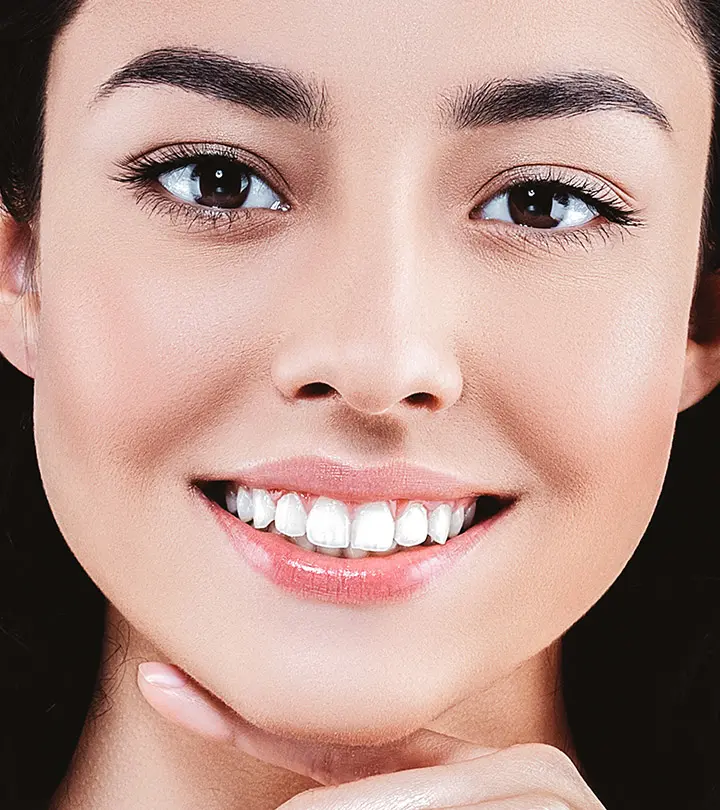
Image: Shutterstock

Everyone wants to get clear and spotless skin, with or without effort. However, this goal needs a certain amount of diligence, time, effort, and a healthy lifestyle to get it. Environmental stressors like dust, pollution, humidity, harsh weather, improper sleep and diet, too much junk food, makeup, dehydration, anything, and everything can strip your face of its natural glow and moisture. While makeup, concealers, and foundations can help you feel and look spotless for a while, it doesn’t make your skin healthy and radiant from within!
To keep the blood rushing to your face, you need to take a balanced and healthy diet supplemented with proper exercise and an active lifestyle. In addition, proper gentle cleansing, toning, and moisturizing all nourish your skin and keep it well hydrated. While you need to fix these things to get your skin feeling healthy, However, if you still find yourself googling “how to get clear skin naturally at home” every late night, you can try some of these home remedies. These remedies can help you achieve your natural glow and radiance back! Read on to try a few for yourself and see the difference.
In This Article
How To Get Clear Skin
1. Detox Water For Clear Skin
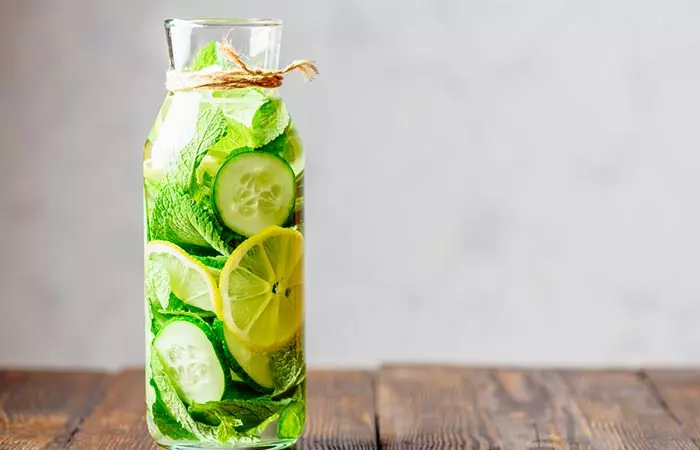
Cucumber has cooling properties and rejuvenates the skin (1), (2). Lemon helps manage endocrine dysfunction, thus eliminating one of the most common reasons for developing spots and acne (3), (4). Mint aids in regulating indigestion and clearing any internal infections (5).
You Will Need
- 2 L water
- 1 cucumber
- 1 lemon
- A handful of mint leaves
- A pitcher
What You Have To Do
- Slice the cucumber and lemon and drop the pieces in an empty pitcher. Add the mint leaves as well.
- Pour water over these and refrigerate.
- Keep sipping this water all day long.
How Often Should You Do This
You can continue having this detox water every day for long-lasting healthy and clear skin.
2. Coconut Oil
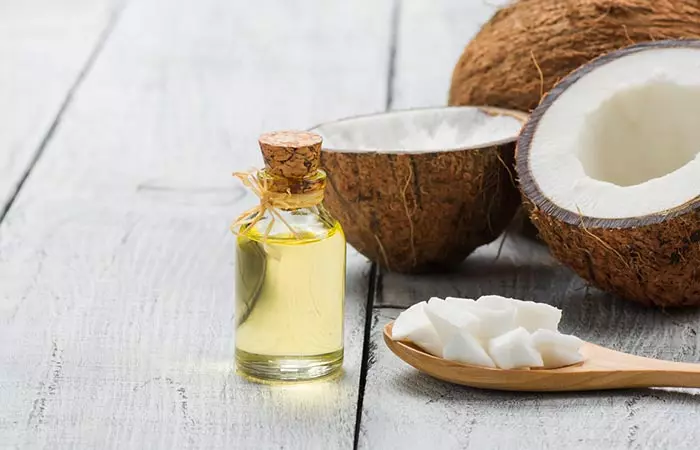
Coconut oil moisturizes your skin. Its antimicrobial properties may help keep the skin clean and infection-free. It contains phytochemicalsi A chemical produced in plants that provide protection from infections, fungi, bacteria, and major chronic diseases. which are powerful antioxidants that scavenge free radicals (6). These activities may contribute to making your skin clear and treating acne.
You Will Need
- Virgin coconut oil
- Cotton ball or cotton pad
What You Have To Do
- Lightly warm up the oil.
- Dot the oil all over the skin with your fingertips and massage the area for a minute or two.
- Let the oil soak in for a couple of minutes. Wipe away the excess oil with a cotton ball/pad.
How Often Should You Do This
Do this 2 times a day.
Caution: Do not try this remedy if you have acne-prone skin as coconut oil may aggravate the condition.
3. Green Tea
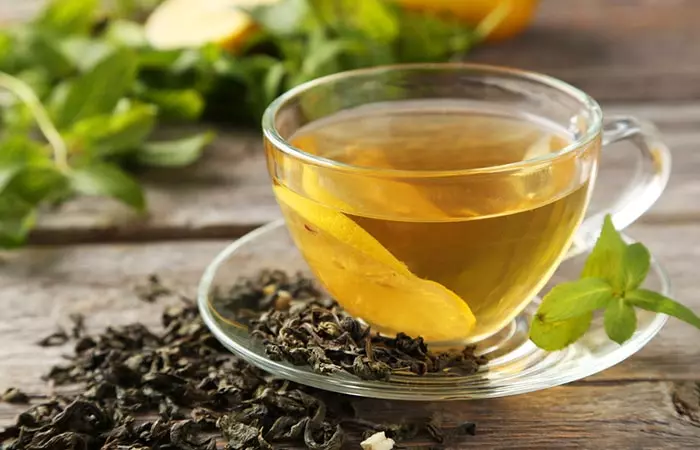
Doctors recommend the daily consumption of green tea for a healthy body and clear skin. Green tea contains antioxidants that can nourish, heal, and detoxify your body (7). This, in turn, reflects on your skin. You can also use skin care products like face wash, moisturizer, and facial packs that contain green tea for clear and healthy-looking skin (8).
You Will Need
- Green tea bag
- A cup of hot water
- Honey (to taste)
- Lemon juice (to taste)
What You Have To Do
- Steep the green tea bag in hot water for a few minutes.
- Remove the tea bag and add honey and lemon juice.
- Sip this herbal tea while it is warm.
How Often Should You Do This
Drink 2-3 cups of green tea in a day.
Caution: Over-consumption of green tea (more than 8 cups per day) may be harmful. It can cause negative effects due to its caffeine. These negative effects, which range in severity from minor to extreme, include headache and increased heart rate.
4. Lemon
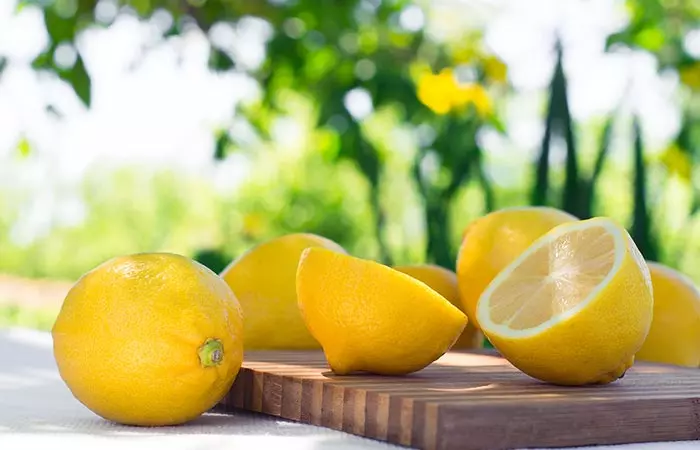
Lemon juice is a rich source of vitamin C, which helps in skin lightening (9). This remedy may help you get rid of blemishes and achieve clear skin (10).
You Will Need
A lemon
What You Have To Do
- Cut a lemon in two halves.
- Rub one half directly onto your skin in a circular motion.
- Do this for 5 minutes. Rinse your face with cold water.
How Often Should You Do This
You can do this once daily.
Caution: If you have sensitive skin, do not try this remedy as it may cause redness, irritation, and burn your skin. Do a patch test on your inner elbow and wait for 30 minutes to check if there is any reaction. If your skin is irritated, do not proceed with this remedy.
5. Honey For Glowing Skin
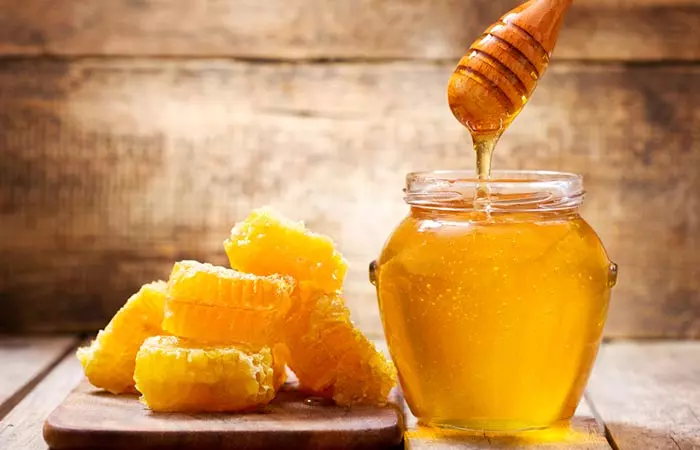
Honey contains vitamins and minerals that nourish the skin. It also contains antioxidants, called flavonoids, which can give you clear and healthy-looking skin. Honey has emollient properties that moisturize your skin and soften it (11).
You Will Need
1 teaspoon raw honey
What You Have To Do
- Apply a thin layer of honey on a clean and dry face.
- Let it sit for about 15 minutes.
- Rinse with lukewarm water.
How Often Should You Do This
Repeat this every day.
 Trivia
Trivia6. Aloe Vera
Aloe vera has skin-friendly, antiseptic, and anti-inflammatory properties. It stimulates collageni A protein in the connective tissues that maintains the structural framework of tissues and promotes skin elasticity. and help maintain tissue structure.” ]that produce collagen and elastini Elastic proteins in tissues of the lungs, bladder, and other ligaments that allow them to stretch and shrink as required. fibers, increasing the skin’s elasticity. It also acts as an astringenti The property of a substance or drug used for skin-tightening as it helps contract body tissues and skin cells by removing excess moisture. and tightens pores. Aloe vera is an excellent moisturizing agent and helps eliminate dryness and flaking of skin (12).
You Will Need
A leaf from the aloe vera plant
What You Have To Do
- Remove the thorny sides and the green outer covering from the aloe vera leaf.
- Cut the gel into small cubes.
- You can either grind the cubes to a pulp or rub them directly onto the skin.
How Often Should You Do This
Include the aloe vera remedy in your daily skincare routine for spot-free, flawless skin.
Caution: Aloe vera might not work for all skin types, and may cause a burning sensation. So it’s advised to do a patch test before using it on your face.
7. Olive Oil
Olive oil contains vitamin E that hydrates the skin and restores its elasticity (13). It also contains phenolic compounds that reduce inflammation. These properties reduce oxidative damage, promoting skin reconstruction (14). This, in turn, can improve your skin health.
You Will Need
- Extra virgin olive oil
- Soft washcloth
- Hot water
What You Have To Do
- Apply a few drops of extra virgin olive oil on the skin.
- Follow this up with a gentle massage in circular motions.
- Leave it on for a few minutes.
- Wipe it off using a washcloth dipped in hot water.
How Often Should You Do This
Repeat this every night before going to bed.
Caution: Make sure that the water is not scalding hot.
 Quick Tip
Quick Tip8. Oatmeal
Oatmeal soothes the skin and exfoliates the dead skin cells. It also moisturizes the skin and exhibits anti-inflammatory and antioxidant activities (15). These properties make it a good cleanser, moisturizer, and anti-inflammatory agent.
You Will Need
- 2 tablespoons oatmeal
- 1 teaspoon lemon juice
- 1 teaspoon honey
What You Have To Do
- Mix all the ingredients to form a thick paste. Add a little water if required.
- Apply this mask on the face and neck. Leave it on for 15 minutes.
- Rinse with lukewarm water.
How Often Should You Do This
Apply this mask 2 times a week
9. Rose Water
Rosewater is one of the most commonly used natural remedies for clear and glowing skin. It exhibits anti-inflammatory and antioxidant properties (16). It has anti-aging properties and promotes the production of collagen and elastin for healthy-looking skin. It is also a natural astringent and tones the skin.
You Will Need
- Rosewater
- Cotton ball
What You Have To Do
- Place the rose water in the refrigerator for 30 minutes.
- Apply it all over a clean face and neck using the cotton ball.
- Let it air dry. Moisturize as usual.
How Often Should You Do This
Do this 2 times a day.
10. Potato
Potatoes contain enzymes and vitamin C that can nourish your skin. It also exerts an antiseptic action on the skin and leaves behind a youthful glow. The pulp is acidic and helps in sloughingi The process of shedding a layer of dead skin either through exfoliation or due to medical and biological reasons. off dead skin cells, revealing glowing skin underneath (17).
You Will Need
A potato
What You Have To Do
- Cut the potato into round slices.
- Take a slice and rub it onto your skin in circular motions.
- Rub the slices for five minutes and wash it off with cold water.
How Often Should You Do This
Follow this routine once daily for best results.
11. Turmeric
Turmeric is a natural antiseptic and therapeutic agent and is widely used to treat minor cuts, wounds, pimples, and acne (18). It is also one of the most effective ways to reduce spots and blemishes.
You Will Need
- 2 tablespoons turmeric powder
- 1/4 cup water
What You Have To Do
- Mix two tablespoons of turmeric with water to make a thick paste.
- Apply this paste over your face.
- Let it stay on for about five minutes. Rinse your face with cold water.
How Often Should You Do This
Apply the turmeric face pack daily.
12. Tomato
Tomato contains lycopene, a powerful antioxidant that provides sun protection and protects your skin from UV damage and oxidative stress (19). This can keep the skin healthy and youthful.
You Will Need
- A tomato
- 2 teaspoons rose water
What You Have To Do
- Make a pulp of the tomato and mix it with two teaspoons of rose water.
- Apply this mixture on your face and keep it on for 10 minutes.
- Wash your face with cool water and pat dry with a soft towel.
How Often Should You Do This
You can do this daily.
13. Apple Cider Vinegar
Apple cider vinegar possesses antimicrobial properties that can help in preventing and treating infections (20). The acids present in ACV exfoliate dead skin cells and reveal a fresh and healthy layer of skin cells. ACV also acts as an astringent that can prevent your pores from getting infected and inflamed.
You Will Need
- 1 part apple cider vinegar
- 1 part water
- Cotton ball
What You Have To Do
- Mix ACV with water and soak the cotton ball in it.
- Apply the cotton ball to the skin and leave it on overnight.
- Wash the area in the morning.
- You can also add a teaspoon of ACV to a glass of water and drink it every morning.
How Often Should You Do This
Do this every night before going to bed.
In addition to following these remedies, you also need to make changes in your diet to get clear and healthy skin.
Key Takeaways
- Consume detox water containing cucumber, lemon, and mint leaves to eliminate toxins
- To soften and moisturize a clean face, apply a thin layer of honey.
- Use coconut oil or olive oil to massage your face to hydrate your skin.
- Wash your face with cold water twice daily to keep your face clean.
Diet For Clear And Healthy Skin
Although research on the connection between diet and healthy skin is still in its primitive stages, a study shows that a low glycemic diet can help prevent acne (21).
The low-glycemic diet involves consuming foods that have a low glycemic indexi The measure of how much and how quickly a food, mainly carbohydrates, affects blood sugar levels on consumption. . Foods with a low GI can help control blood sugar levels (22).
Here’s what you need to consume and avoid to keep your blood sugar levels under control.
- Fruits: Apricots and orange
- Vegetables: Green leafy vegetables and tomatoes.
- Nuts
- Beans and lentils
- Avoid processed carbs and aerated drinks
Including omega-3 fatty acid foods in your diet, such as fish, flaxseed, and walnuts, may also help improve your skin health by reducing inflammation and strengthening the skin barrier (23).
According to a cross-sectional study conducted with 24452 participants, 11324 (46%) reported past or current acne. Of these, 3576 individuals (32%) believed that diet was a factor in their acne. The study showed a significant association between current acne and the consumption of fatty and sugary products.
You can drink this healthy green juice for clear and radiant skin.
Green Juice
This green juice or smoothie contains vitamins and minerals, which are healthy for the body and skin. It acts as a beauty detox.
You Will Need
- 1 cucumber
- A handful of kale
- 5-6 celery stalks
- 1/2 green apple
- A handful of cilantro leaves
- Juice of one lemon
- Water
What You Have To Do
- Grind all the ingredients with a little water to make this healthy green juice.
- Drink the juice in the mornings.
How Often Should You Do This
Consume this juice once daily.
Apart from the home remedies listed above, here are a few clear skin tips to get radiant and spot-free skin.
Additional Tips To Get Clear Skin
- Drink Water– Dr. Crystal Dinopol, DPDS, a dermatologist, says, “Aside from using prescription medications from your dermatologist, avoiding direct sun exposure and keeping yourself hydrated can speed up the improvement of most skin problems.” Drink enough water to keep your body healthy and hydrated. It will flush out all the toxins and help maintain your skin’s hydration levels. This will help you get clear, glowing, and healthy skin.
Zaiby, a blogger, shared her reaction when she found out about the foods that affect her skin: “I just came to know that cheese makes me [my skin] breakout around the cheeks. Yes, it took me 27 years to know this. Also, excessive coffee intake makes me breakout in the same area (i).” She suggests that along with increasing one’s water intake, one should eliminate triggering foods from one’s diet to maintain clear skin.
- Follow A Balanced Diet – One of the most important tips to get clear skin is to include fresh fruits/juices and green leafy vegetables in your diet.
- Apply Moisturizer Daily – If you have extremely dry skin, it starts compensating for the dryness by producing natural skin oils, which can lead to acne and breakouts. To avoid this, moisturize your skin daily, and do twice as much during winters. This will help prevent flaky and dry skin. Dr. Nadir Qazi , a board-certified physician, says, “It may seem counter-intuitive as often people believe oils are the enemy of those with acne-prone skin, but everyone needs a moisturizer to help bolster the skin barrier and protect it from outside damage. Jojoba and argan oils are fantastic natural oils that are low on the comedogenic scale, so they won’t clog pores while also helping to actively heal and protect the skin.”
- Wash Your Face Twice Daily – Always wash your wash before you go to bed to get rid of the day’s grime that may have settled in your pores. Ensure to wash your face with cold water (cold water closes the pores) for 35-40 seconds with a dime-sized amount of face wash to get rid of the dirt and oils. You may also cleanse your skin with warm water, as it helps decongest the pores, making it easier to wash away impurities. Regular cleansing with warm water promotes clear skin, ensuring a fresh, radiant complexion and prevents breakouts.
While it is recommended to use a face wash to cleanse your skin, Zaiby has different views about it. She shares that she likes to wash her face with nothing but plain water and adds, “Since August 22, 2015, I have stopped using soap, face wash, and any other chemical or product on my face. YES, no soap, no face wash, and no night creams.”
- Be Gentle – Dr. Qazi says, “Use products with nourishing ingredients that won’t harm the skin further or strip it of its natural oils. Often, acne can be worsened by the steps we take to avoid it, astringent toners, oil-controlling face washes, and harsh exfoliating scrubs. Avoid products with simple alcohols like ethanol, parfum, or artificial fragrances that may cause further irritation and dryness.” Scrubbing your skin too hard can leave it red and irritated. Skip harsh washcloths and loofahs as they can cause breakouts and aggravate dryness.
- Use Sunscreen – Sunscreen can protect your skin from UV radiation while also lowering exposure to free radicals (which are linked to aggravating acne and aging). Remember that gel-based sunscreen is the best choice for oily and combination skin. In comparison to cream-based sunscreens, gel sunscreens are often lighter and oil-free.
- Exfoliate – Exfoliation can remove layers of dead skin cells, dirt, and oil that clog your pores. Use products with glycolic acidi A naturally occurring chemical compound in sugar cane that makes the skin smooth by helping shed dead skin cells. and lactic acid as they help absorb the oils and grime settled in your pores (24). Make sure you moisturize your skin later to avoid dryness.
- Stop Touching Your Face (Don’t Pop) – Your hands have millions of bacteria that can transfer onto your skin. Thus, refraining from touching your face without washing your hands properly is an important way to get clear skin. If you pop your pimples, your present condition can get worse, and there are chances of infection too. Use a cotton pad to check on the problem areas. If you have acne and acne marks, you can also use products containing an acne-fighting agent like benzoyl peroxide. It is an FDA-approved ingredient that helps eliminate acne-causing bacteria, reduces inflammation, unclogs pores, and may prevent future breakouts (24). However, consult a doctor to determine the formulation and concentration of benzoyl peroxide.
- Try The 3-Step Skin Care Routine – This routine is meant only for acne-prone skin. The steps include using salicylic acidi A colorless natural compound in plants that contains anti-inflammatory and antibacterial properties and helps exfoliate skin and clean pores. cleanser, a toner or astringent, and a non-comedogenic (oil-free) moisturizer. These products create an exfoliating effect on your skin, removing dead skin cells right away. However, this routine can cause skin dryness and irritation. Therefore, do a patch test before proceeding with the routine.
- Consult A Dermatologist – If home remedies are not helpful, seeking professional help from a dermatologist is necessary to resolve the issue. Dr. Qazi opines, “Cosmetic treatments from a qualified dermatologist, such as cortisone shots, medical grade chemical peels, and laser acne treatments, not only help heal stubborn acne but also reduce the likelihood of scarring.” Learn about your skin and use prescribed medications to achieve healthy skin.
- Try Prescription Medicines – Your doctor may suggest topical retinoidsi Compounds derived from vitamin A used in cosmetics to reduce wrinkles, signs of aging, mild acne and fine lines. , creams, gels, and pills resolve different skin issues. Dr. Qazi adds, “Retinoids prescribed by a doctor or over-the-counter retinol can greatly benefit stubborn acne.”
- Relax Your Mind – A study shows that stress is directly proportional to skin disorders (26). Emotional stress can take a toll on your skin and lead to skin disorders. Hence, look for healthy ways for stress management by doing yoga, exercise, or listening to music or attending art therapy, meditation, etc. Most importantly, get 7- 8 hours of sleep every day. These methods help in managing hormone levels and allow your body to function properly.
- Clean Makeup Brushes – Clean your makeup brushes at least once every two weeks. Bacteria breed in moist areas, and brushes that come in regular contact with liquid/creamy makeup products are potential breeding grounds for bacteria. Thus, they need to be cleaned every week. Brushes that are less frequently used or used for dry makeup products can be cleaned every three to four weeks. Wash the brushes with shampoo and let them dry overnight.
- Remove Makeup – Remove your makeup before going to bed. Your skin regenerates and repairs itself while you sleep. If you don’t remove the makeup from your skin, you’ll end up with clogged pores, and your skin will be prone to breakouts. Use the olive oil home remedy or a makeup remover to remove all traces of makeup from the face. Also, limiting makeup use is a good way to let your original skin breathe.
- Avoid smoking – Smoking can cause such severe skin damage that your skin will begin to resemble the worst version of itself before you know it. Avoiding smoking is one of the best ways to achieve clear skin. According to studies, smoking causes premature aging, such as wrinkles (26).
- Use An Oil-Free Face Wash – Use a face wash that is specifically formulated for oily skin. It will help remove excess oil, dirt, and impurities without over-drying the skin. Look for ingredients like salicylic acid, tea tree oil, or activated charcoal, which help prevent acne breakouts, improve skin texture, and clarify and brighten the skin.
A consistent skincare routine is always an important factor to achieve clean and clear skin. But your skincare routine should consist of good quality products that enhance skin health. Check out the next section to learn more!
Product Recommendations
You may consider incorporating the following types of products into your skincare routine to achieve clear skin:
- You should buy products that specifically cater to your skin type and issues. For example, if you have oily skin, buy water-based products instead of oil-based ones. If you have dry skin, avoid alcohol-based products.
- Pick a skincare routine that caters to your skin type. For example, those with oily skin should follow a cleaning, exfoliating, toning, and moisturizing routine on a daily basis. However, those with dry skin don’t need to use a toner as often.
- Pick gentle cleansers that match your skin type. Harsh cleansers contain chemicals that can irritate or dry out the skin.
- Use non-comedogenic moisturizers that don’t clog pores.
- Use exfoliants, featuring glycolic or salicylic acid, at least once a week to remove dead skin cells
- Include topical treatments with benzoyl peroxide or retinoids for targeted acne treatment.
- Add hydrating serums with hyaluronic acid or glycerin to maintain moisture levels.
- Use clay masks (bentonite clay or kaolin clay) with aloe vera once a week to absorb excess oil and prevent breakouts
- Apply sunscreens with zinc oxide or titanium dioxide with broad-spectrum protection (level 30 or higher) against UV rays.
Infographic: DIY Natural Face Masks For Clear Skin
Check out these homemade face masks in the infographic below if you are looking for natural ways to give your skin a healthy glow. Using face masks is one of the best ways to achieve clear and glowing skin. The masks can also help keep skin healthy. Keep scrolling for more information.
Some thing wrong with infographic shortcode. please verify shortcode syntax
Takeaway
Environmental pollutants, stress, lifestyle choices, and diet can greatly impact the skin and leave it dull and lifeless. If you are wondering how to get glowing skin? Good lifestyle habits, an exercise regime, a proper diet, a good skincare routine, and natural remedies can be the best ways to achieve the same. As per some effective home remedies, you can drink detox water and use natural ingredients like tomato, lemon, green tea, rose water, aloe vera, certain oils, apple cider vinegar, etc. A low-glycemic diet is helpful as well as it may prevent acne breakouts which are a primary cause for skin blemishes. Green juice is another great addition to your diet as it contains essential vitamins and keeps your skin hydrated. Though you cannot achieve clear skin overnight, it is very much achievable with conscious effort and generous amounts of TLC.
Frequently Asked Questions
How can I maintain clear skin as I age?
Keeping a regular skincare routine, choosing products that match your skin type, and emphasizing sun protection may help maintain your clear skin as you age.
Can apple cider vinegar give clear and glowing skin?
Although apple cider vinegar is commonly used to treat skincare issues, there is no scientific evidence to prove its efficacy in treating skin issues.
How fast can skin clear up?
This depends on your skin type and the lifestyle you follow. If you eat a balanced diet, follow a proper skin care routine, and exercise regularly, your skin may clear up within 3 to 4 months.
Is coffee good for the skin?
Yes, coffee contains antioxidants that can reduce dark spots and photoaging (28). You can consume it daily or make your own coffee face pack with ingredients like turmeric, yogurt, or coconut oil for healthy, clear, and glowing skin.
Is milk good for the skin?
Yes, milk can help reduce acne lesions, lighten your skin, and soothe and hydrate your skin (29). You can consume milk daily or apply it to your face with a cotton pad to make your skin clearer.
Is rice water good for the skin?
Yes, rice water contains antioxidants that help slow down signs of aging, soothe your skin, and even your skin tone (30).
Illustration: How To Get Clear Skin - 14 Natural Tips For Spotless Skin
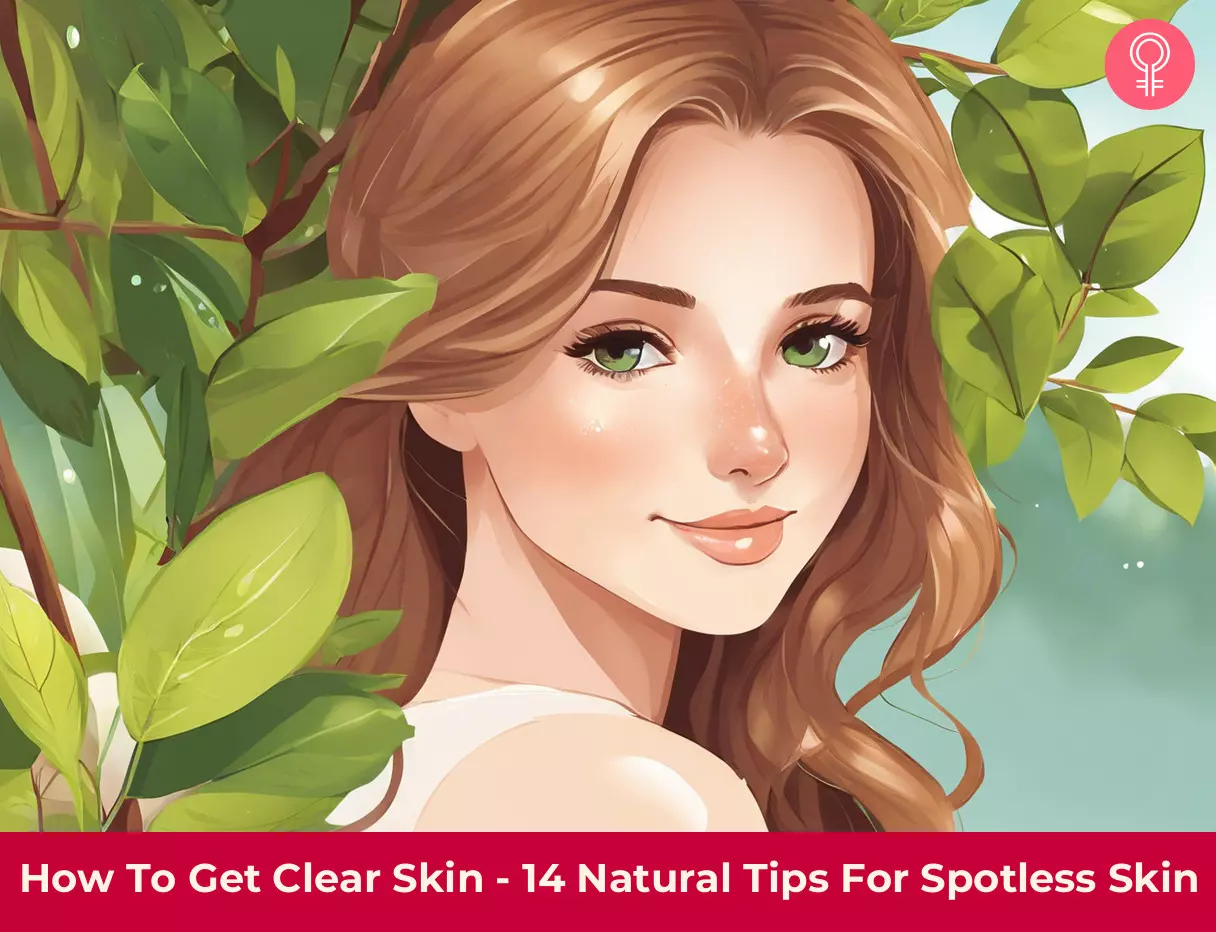
Image: Stable Diffusion/StyleCraze Design Team
Learn how to maintain clear skin without spending any money on it. Check out this video to get 15 tips and tricks that will help you maintain healthy, glowing, and radiant acne-free skin!
Personal Experience: Source
StyleCraze's articles are interwoven with authentic personal narratives that provide depth and resonance to our content. Below are the sources of the personal accounts referenced in this article.
i. 100% clear skin is possible!
https://allthingsrainbow.wordpress.com/2015/11/03/100-clear-skin-is-possible/
References
Articles on StyleCraze are backed by verified information from peer-reviewed and academic research papers, reputed organizations, research institutions, and medical associations to ensure accuracy and relevance. Read our editorial policy to learn more.
- Phytochemical and therapeutic potential of cucumber. Fitoterapia, US National Library of Medicine, National Institutes of Health.
https://pubmed.ncbi.nlm.nih.gov/23098877/ - Exploring cucumber extract for skin rejuvenation, African Journal of Biotechnology Vol. 10(7), Academic Journals
https://academicjournals.org/article/article1380726732_Akhtar%20et%20al.pdf - A LEMON a Day Keeps Fatigue Away – The ABCDE of Fatigue, European Endocrinology, US National Library of Medicine, National Institutes of Health.
https://www.ncbi.nlm.nih.gov/pmc/articles/PMC5954589/ - Acne and systemic disease. The Medical Clinics of North America, US National Library of Medicine, National Institutes of Health.
https://pubmed.ncbi.nlm.nih.gov/19932324/ - Radio-Protective Potential And Antimicrobial Activity Of Pudina. (Mentha Spp. /Mint), World Journal of Pharmaceutical Research, Semantic Scholar.
https://wjpr.net/abstract_file/9727 - Cocos nucifera (L.) (Arecaceae): A phytochemical and pharmacological review, Brazilian Journal of Medical And Biological Research, US National Library of Medicine, National Institutes of Health.
https://www.ncbi.nlm.nih.gov/pmc/articles/PMC4671521/ - Beneficial effects of green tea: A literature review, Chinese Medicine, US National Library of Medicine, National Institutes of Health.
https://www.ncbi.nlm.nih.gov/pmc/articles/PMC2855614/ - Green tea and skin. Archives of Dermatology, US National Library of Medicine, National Institutes of Health.
https://pubmed.ncbi.nlm.nih.gov/10926734/ - The hunt for natural skin whitening agents, International Journal of Molecular Sciences, Us National Library of Medicine, National Institutes of Health.
https://www.ncbi.nlm.nih.gov/pmc/articles/PMC2801997/ - The Roles of Vitamin C in Skin Health, Nutrients, U.S. Department of Health and Human Services.
https://www.ncbi.nlm.nih.gov/pmc/articles/PMC5579659/ - Medicinal and cosmetic uses of Bee’s Honey – A review, Ayu, Us National Library of Medicine, National Institutes of Health.
https://www.ncbi.nlm.nih.gov/pmc/articles/PMC3611628/ - ALOE VERA: A SHORT REVIEW, Indian Journal of Dermatology, US National Library of Medicine, National Institutes of Health.
https://www.ncbi.nlm.nih.gov/pmc/articles/PMC2763764/ - Effect of Olive Oil on the Skin, Olives in Health and Disease Prevention, ResearchGate.
https://www.researchgate.net/publication/275044663_Effect_of_Olive_Oil_on_the_Skin - Anti-Inflammatory and Skin Barrier Repair Effects of Topical Application of Some Plant Oils, International Journal of Molecular Sciences, US National Library of Medicine, National Institutes of Health.
https://www.ncbi.nlm.nih.gov/pmc/articles/PMC5796020/ - Colloidal oatmeal: history, chemistry and clinical properties. Journal of Drugs in Dermatology, US National Library of Medicine, National Institutes of Health.
https://pubmed.ncbi.nlm.nih.gov/17373175/ - Pharmacological Effects of Rosa Damascena, Iranian Journal of Basic Medical Sciences, US National Library of Medicine, National Institutes of Health.
https://www.ncbi.nlm.nih.gov/pmc/articles/PMC3586833/ - Health Benefits and Cons of Solanum tuberosum, Journal of Medicinal Plants Studies.
https://pubmed.ncbi.nlm.nih.gov/23454444/ - Effects of Turmeric (Curcuma longa) on Skin Health: A Systematic Review of the Clinical Evidence. Phytotherapy Research, US National Library of Medicine, National Institutes of Health.
https://pubmed.ncbi.nlm.nih.gov/27213821/ - Tomato paste rich in lycopene protects against cutaneous photodamage in humans in vivo: a randomized controlled trial. The British Journal of Dermatology, US National Library of Medicine, National Institutes of Health.
https://pubmed.ncbi.nlm.nih.gov/20854436/ - Antimicrobial activity of apple cider vinegar against Escherichia coli, Staphylococcus aureus and Candida albicans; downregulating cytokine and microbial protein expression, Scientific Reports, US National Library of Medicine, National Institutes of Health.
https://www.ncbi.nlm.nih.gov/pmc/articles/PMC5788933/ - Acne improves with a popular, low glycemic diet from South Beach, Journal Of The American Academy of Dermatology.
https://www.jaad.org/article/S0190-9622%2808%2901520-X/abstract - Glycemic index and glycemic load: measurement issues and their effect on diet-disease relationships. European Journal of Clinical Nutrition, US National Library of Medicine, National Institutes of Health.
https://pubmed.ncbi.nlm.nih.gov/17992183/ - The Potential Uses of Omega-3 Fatty Acids in Dermatology: A Review
https://pubmed.ncbi.nlm.nih.gov/32463305/ - Dual Effects of Alpha-Hydroxy Acids on the Skin, Molecules, US National Library of Medicine, National Institutes of Health.
https://www.ncbi.nlm.nih.gov/books/NBK537220/ - Benzoyl Peroxide
https://www.ncbi.nlm.nih.gov/pmc/articles/PMC6017965/ - Stress and the skin. Giornale Italiano di Dermatologia e Venereologia, US National Library of Medicine, National Institutes of Health.
https://pubmed.ncbi.nlm.nih.gov/20467395/ - Cigarettes Smoking and Skin: A Comparison Study of the Biophysical Properties of Skin in Smokers and Non-Smokers
https://pubmed.ncbi.nlm.nih.gov/32440305/ - Skin photoprotection and consumption of coffee and polyphenols in healthy middle-aged Japanese females, PubMed
https://pubmed.ncbi.nlm.nih.gov/25041334/ - Milk Proteins—Their Biological Activities and Use in Cosmetics and Dermatology, ResearchGate
https://www.researchgate.net/publication/351995268_Milk_ProteinsTheir_Biological_Activities_and_Use_in_Cosmetics_and_Dermatology - Rice Water: A Traditional Ingredient with Anti-Aging Efficacy, ResearchGate
https://www.researchgate.net/publication/324179387_Rice_Water_A_Traditional_Ingredient_with_Anti-Aging_Efficacy
Read full bio of Dr. Priya Gill
- Dr. Nadir Qazi, DO, has over 6 years of experience in cosmetic dermatology and plastic surgery. He is a member of the American Academy of Cosmetic Surgery and an instructor for advanced injections and laser techniques. He is well-known among celebrities and elite models for his promising liposuction results and his innovative facial contouring technique known as the HD Lift™.
 Dr. Nadir Qazi, DO, has over 6 years of experience in cosmetic dermatology and plastic surgery. He is a member of the American Academy of Cosmetic Surgery and an instructor for advanced injections and laser techniques. He is well-known among celebrities and elite models for his promising liposuction results and his innovative facial contouring technique known as the HD Lift™.
Dr. Nadir Qazi, DO, has over 6 years of experience in cosmetic dermatology and plastic surgery. He is a member of the American Academy of Cosmetic Surgery and an instructor for advanced injections and laser techniques. He is well-known among celebrities and elite models for his promising liposuction results and his innovative facial contouring technique known as the HD Lift™.
Read full bio of Shaheen Naser
Read full bio of Anjali Sayee
Read full bio of Monomita Chakraborty







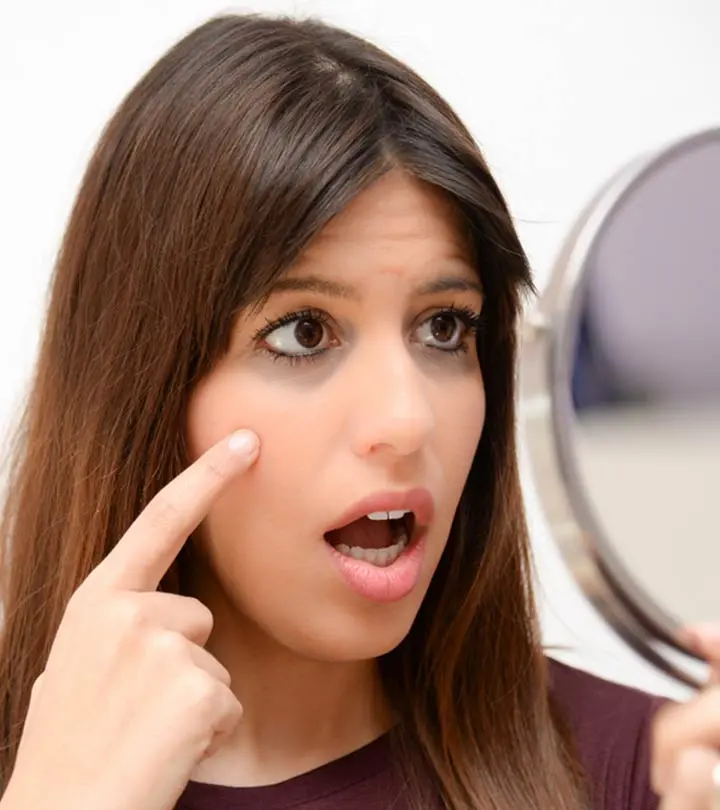
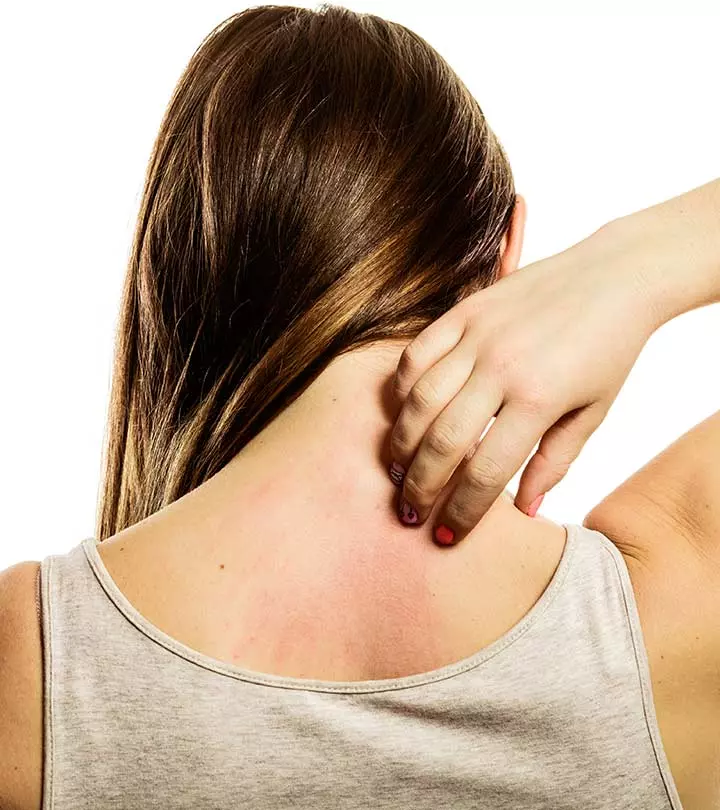

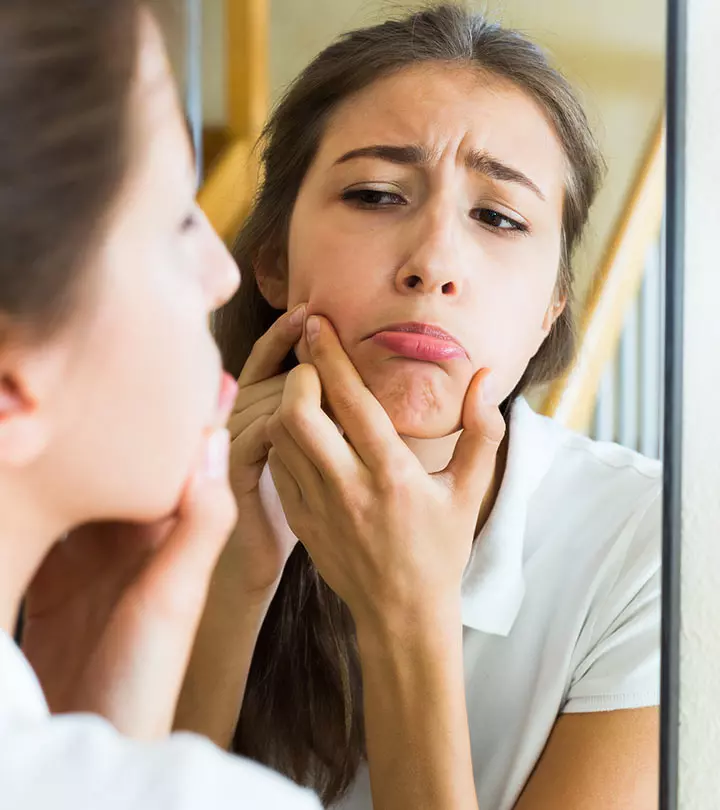

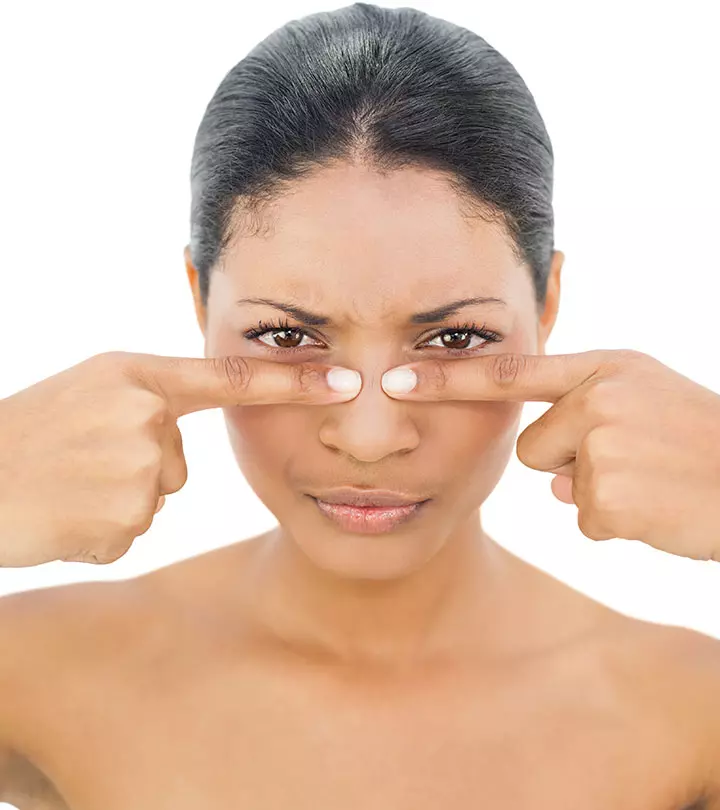





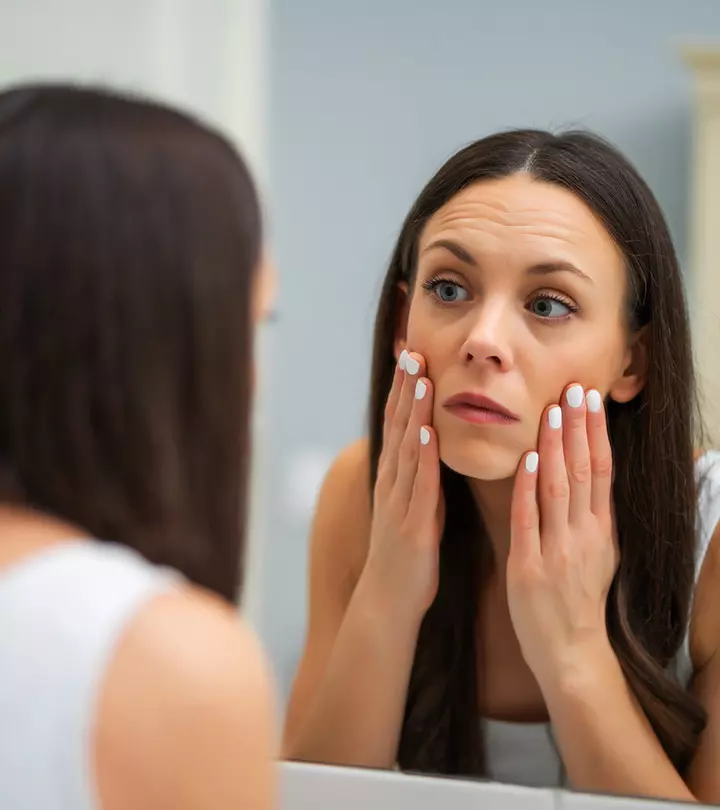
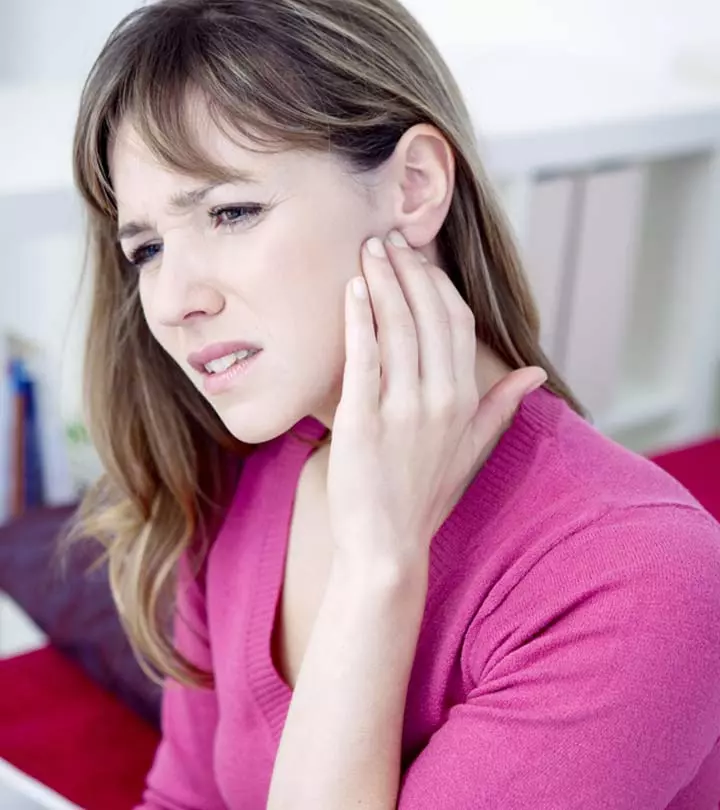

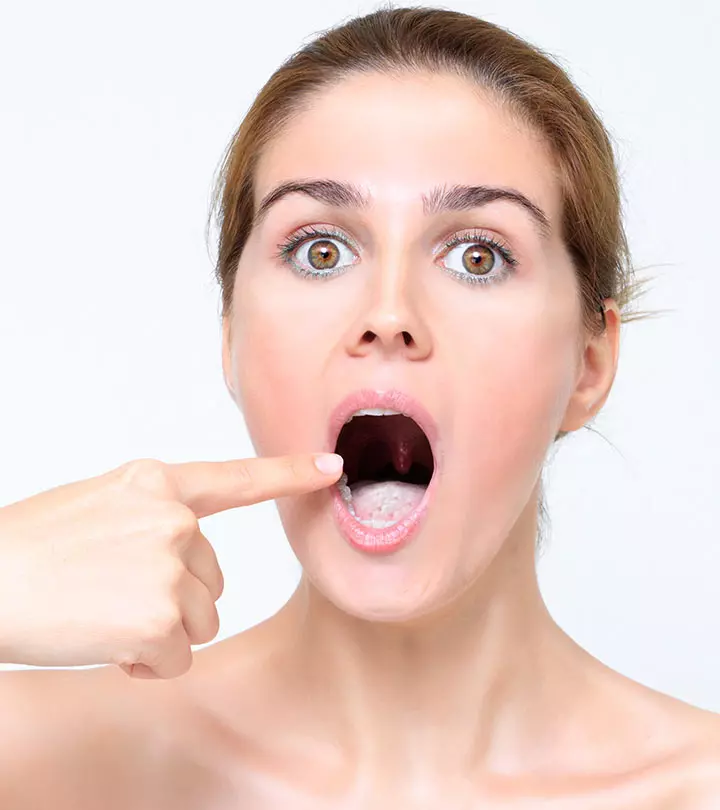



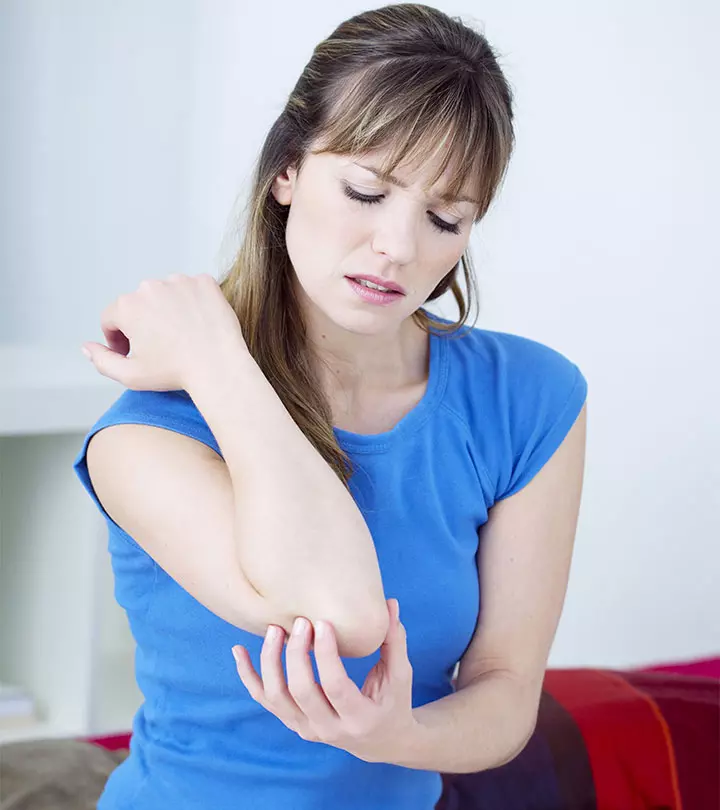
Community Experiences
Join the conversation and become a part of our empowering community! Share your stories, experiences, and insights to connect with other beauty, lifestyle, and health enthusiasts.